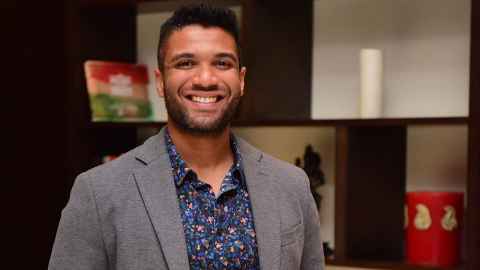Power of educators to make students’ dreams reality
6 June 2019
Opinion: Mohamed Alansari writes that educators and mentors often underestimate the power they have to influence positive life trajectories for their students.

Growing up in a household that encouraged aspirational thinking, I often talked to my parents about my dreams and who I wanted to be when I grew up.
I used to tell people ‘one day, I will become a TV presenter!’ I wanted to reach out to every home and family, to make a difference in their lives by being in their living room. I still wonder how my career would have turned out if I had pursued that pathway. Or whether it was even possible to have a TV career considering my loud, dorky laugh, frizzy hair and occasional squint – perhaps I’d have been better off in radio.
Anyway, my intermediate teacher overheard me talking to friends in the school corridor about my potential TV debut and becoming a talkshow host – yes, a full-on production was in the works. I remember that day like it was yesterday. The teacher walked past and snarkily said in front of everyone: ‘Pick a real job, Mohamed, do something meaningful.’ Off he went, and so my dreams of a media career were crushed.
Over the years, I wondered whether other people have experienced similar scenarios to mine. What were their dreams? Who changed their minds? Who could have helped them achieve their goals and aspirations? What would have happened if someone had come into their lives and believed in their dreams? Fortunately, my current research explores exactly that.
Pick a real job, Mohamed, do something meaningful.
I am the principal investigator of a longitudinal project called ‘I Have a Dream’, taking place in Whāngārei. We are working with 400 children, their schools and their families in low socio-economic areas. Those involved share the same dream as us: to break the intergenerational cycle of poverty, and open up opportunities for success, however that success might look in the eyes of the children.
This is an innovative community-based approach, where each group of students is assigned a mentor, known as a navigator, who helps the students navigate their dreams from primary to secondary and through to tertiary if that’s what they desire.
This is our second year in this partnership and preliminary results from our mixed-method investigation are promising. There were statistically significant improvements in students’ achievement in reading and maths by the end of 2018, as well as sustained positive levels of school satisfaction and future outlook.
Over time, navigators have also become more positive in their beliefs about how they can influence student educational outcomes. Teachers have reported increasing levels of value in having navigators providing support and mentoring to the students. We appear to be on the right track.
What’s astonished me most, is the students’ ability at a young age to articulate what it means for them to have a significant support person, as evidenced by the qualitative findings of the project. For Tane, who wants to be an All Black when he grows up, it was something as simple as his navigator celebrating with him, after he was praised in PE classes, and challenging him to try even harder next week.
For Jesse, who wants to be a dancer, it was when her navigator asked her about her favourite dance moves, and shared funny stories about dancing. For Davie, who wants to be an archaeologist, having a navigator who listened, reacted positively, and helped him Google information about archaeology, was all it took for Davie to name his mentor as his main support person who cared about his success.
It is powerful to realise that student interactions with significant others can influence their beliefs about future success, learning and aspirations. It is even more powerful to realise how much teachers and navigators influence such processes by simply acting, reacting and interacting positively in these learning spaces. It’s exciting to know our project can play a part in improving students’ experiences at school and beyond.
It was some time back, that the teacher unwittingly changed my career trajectory. But it is now in ‘I Have a Dream’ where I, with others, can support each of our 400 dreamers to reach their highest potential, whether they want to be an All Black or a dancer, an archaeologist or an academic.
Too often, educators and mentors underestimate the impact they can have on their students’ academic and life trajectory. ‘I Have a Dream’ is testimony to the importance of human connections, support and high expectations – all of which are pivotal to our roles as educators. The more we believe in our ability to make a difference, rather than talking ourselves, and sometimes the students, down, the more we will help young people make their dreams reality.
Our group welcomes support, ideas, collaborators or volunteers to join us from time to time. Contact me or visit the I Have a Dream website.
Dr Mohamed Alansari is a research fellow within the Quantitative Data Analysis and Research Unit in the Faculty of Education and Social Work. The views in this article reflect personal opinion and are not necessarily those of the University of Auckland.
This article first appeared in the June edition of UniNews.